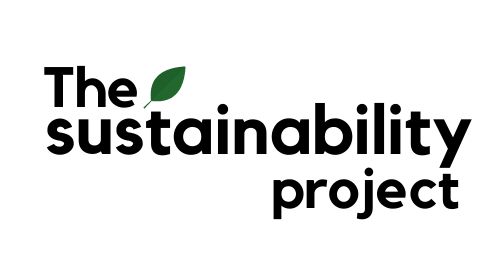On 17th July, our team was given the opportunity to attend Partners For the Environment Forum, an annual event organized by the Ministry of the Environment and Water Resources (MEWR) to bring key partners from the Public, People and Private (3P) sectors together and promote the sharing of ideas and initiatives towards zero waste.
So how did it actually go and what did we learn? Here are some of the highlights!
From the get-go, I felt that MEWR truly made the effort to “walk the talk”. This term was used more than once during the various sharing sessions.
I really appreciated the subtle, yet significant, attempts at organizing a large-scale forum aiming for reduced waste. From accepting the sticker label (as opposed to a plastic lanyard) upon registration to sipping coffee from a ceramic mug and eating my lunch using non-disposable tableware.
The keynote speech given by Minister Masagos Zulkifli, was also highlighted in various news outlets as he introduced many new environmental initiatives under the ministry to look forward to this year.
Another highlight included the presentation of Singapore’s Packaging Awards, a joint initiative by the government, industries and NGOs to reduce packaging waste.
Opening speeches
Dr. Amy Khor’s opening speech hit close to home, as she focused on the importance of both corporate and individual efforts to ultimately reach Singapore’s goal as a zero-waste nation.
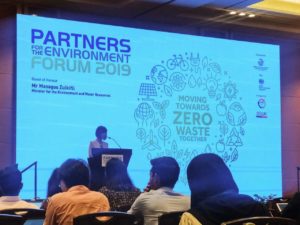
Dr Amy Khor in her opening speech.
For individuals like you and me, she announced the creation of a citizens workgroup to co-create solutions within the community. If you are keen, sign up at towardszerowaste.sg before 23rdAugust!
This year’s Partners For the Environment Forum was organised with the British High Commission in Singapore. As such, British High Commissioner Kara Owen made the second opening speech by sharing the different environment initiatives the UK has taken.
Did you know that the UK currently houses 36% of the world’s offshore wind and will be banning single-use plastics by April 2020?
Despite these success stories, she did ultimately stress that this is not enough to solve climate change issues. The global problem requires both global support and action, including a future-focused relationship between Singapore and the UK.
The similar goals but different approach to solving issues would allow the two countries to learn from each other – an example of successful collaboration was the joint research review project between the UK Science & Innovation Network and the National University of Singapore about marine plastics in South-East Asia.
This year, the forum centered around three sharing sessions, each focusing on a core topic.
Achieving a zero-waste vision
This lofty goal requires focusing on areas of population growth – cities! Being centres of dense populations, cities create waste disposal problems, poor air and water quality issues, and high-energy consumption.
Ms Jacqueline Lam from C40 Cities and Ms Lynn Loh from Hewlett-Packard both maintained the view that targeting cities is paramount to reducing global waste production. As a representative of C40 Cities, a climate leadership group comprising of megacities aiming to address climate change issues, Ms Lam further explained various C40 initiatives that directly addressed a zero-waste vision – this includes the Advancing Towards Zero-Waste Declaration and the C40 Waste To Resources Network.
Another importance step, for corporations in particular, is eco-environmental decoupling. This means to create an economy that was able to sustain economic growth without causing environmental pressure.
One example is when High Commissioner Owen mentioned how the UK managed to pursue economic growth of 72% while simultaneously reducing 42% of carbon emissions since 1990.
On a corporate level, Ms Loh and Ms Annabelle Baker from LUSH Cosmetics, had much to contribute to this topic. For HP, decoupling growth from consumption is one of its circular economy strategies.
For instance, in 2016 they released ink cartridges made with plastic from bottles recycled in Haiti! This created jobs for Haitians and reduced the amount of plastic waste, enabling simultaneous social and environmental change.
Ms Annabelle Baker
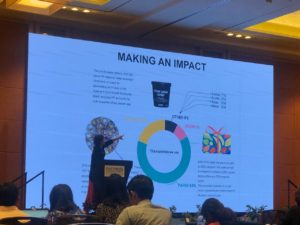
Ms Baker explaining how a large percentage of materials used by LUSH is paper. Only 20% of packaging on (post-consumer) plastics.
Ms Baker shared so many environmental initiatives that allows LUSH to achieve eco-environmental decoupling – it was hard to keep up!
By selling 42.8 million shampoo bars sold since 2005, LUSH saved 4% of the plastics the Great Pacific Garbage Patch. The first #LUSHNAKED store located in Asia – LUSH products sold without packaging — will open in Hong Kong this September.
LUSH is investing in, and will produce, a series of naked makeup! It was rather exciting to hear how large corporations can also make steps to visibly reduce their environmental impact.
Climate change realities
This was definitely the sharing session I was looking forward to the most as an environmental geography student. The main takeaway this session, for me, was that climate change is real and is really happening.
The first 2 speakers shared their expertise as climate scientists by presenting the numbers and facts and communicated the urgency of how we need to act, and fast. In summary, climate change can be summarised by:
rising temperatures
sea level rise
Both of which will have drastic impacts for Singapore. Prof Erland Källén, director of Meteorological Service Singapore, stressed how if humankind continues “Business-As-Usual” without changing our current actions, temperatures in Singapore could potentially hit 40oC by 2050!
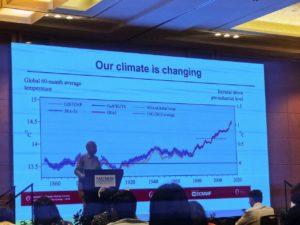
A graph of how different methods of measuring historical temperature changes all point to the same trend of rising temperatures.
Prof Benjamin Horton, Chair of the Asian School for the Environment from Nanyang Technological University, then focused on sea level issues and how this remains a national priority for Singapore. In addition, he shared how tide gauges planted across oceans are used to measure global temperatures.
Regardless of which technique or analysis method was used among various research papers, it is commonly understood in the scientific community that sea levels are definitely rising today. This will potentially result in the flooding of low-lying islands (including Singapore!), and salination of water resources.
Bringing back the “Business-As-Usual” concept, sea levels could potentially rise by a whole metre by 2100 if we do not change our ways. On the bright side, both Prof Källen and Prof Horton mentioned the National Sea Level Research Programme, where $10 million will go into developing a more robust understanding of sea level change in Singapore.
Prof. Herbert Dreiseitl
The third speaker for this session, Prof. Herbert Dreiseitl, then explained how taking into account climate change realities is crucial to designing future cities.
Using increased rainfall as an example, he cited the innovative idea of utilizing soft engineering drainage systems in cities. For example, natural streams and riverine plants, instead of hard concrete canals.
This can metabolise urban water pollution while simultaneously channeling the water towards our reservoirs. One really interesting urban architectural feat that Prof. Dreiseitl lent his expertise in is the Kallang River @ Bishan-Ang Mo Kio Park, the product of a river restoration project completed in 2012 that converted an urbanised concrete canal into a naturalised river!
An example of blue-green infrastructure, it is designed to flood such that the area adjacent to the stream will channel the excess water downstream during heavy rain.
Building successful partnerships
Complex problems require large-scale solutions and collaborative efforts between many different stakeholders. The last session was focused on plastic waste, pollution and the importance of bringing stakeholders together to solve environmental issues.
Mr Stengert, Chief of Strategic Communication and External Relations at WWF-Singapore, shared WWF’s vision of a no-plastic future. He shared WWF’s latest campaign that allows the general public to estimate the amount of microplastic they consume – he himself showed us that the online calculator told him that he eats 6 grams of plastic a week!
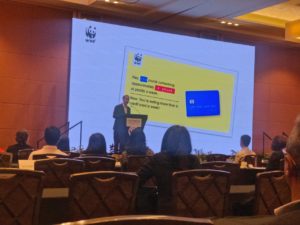
Mr Stengert showing the results of the online calculator!
Ms Kneller is a representative of WRAP – a UK-registered charity that works with individuals and communities to achieve resource efficiency, reduce waste, and achieve an overall circular economy.
She raised various campaigns that WRAP has spearheaded, one of which is the UK Plastics Pact, an initiative that aims to transform the UK plastic packaging sector by 2025 by meeting four pact targets, all of which generally requires plastics in the UK to be compostable or recyclable.
Other campaigns WRAP has engaged in include the Sustainable Clothings Action Plan (focusing on reducing the environmental footprint of clothing) and the Courtald 2025 (focusing on food waste and packaging issues), both of which bring together many stakeholders to encourage collaborative partnership between the public, private and people sectors in the UK.
I was rather overwhelmed by the information, ideas, and strategies that the various stakeholders had shared as the forum drew to a close. It’s not easy to digest 5 hours’ worth of sharing sessions at one go.
There was still some critique about some of the initiatives and policies that were raised during the QnA sessions with regards to their effectiveness. But, I think it’s important to give these organisations credit! It is almost impossible to be perfect, but we’ll have no regrets if we at least try.
Partners For the Environment Forum gave me hope. There are many stakeholders out there, just like me, who believe that we can do better for the environment. Forward-thinking, innovative ideas (so many were shared!) are important to ensure a livable city and a livable earth. I was truly quite inspired that with a combined global effort, we can really make a difference.
A big thank you to MEWR for the invitation to Partners For the Environment Forum 2019!rters For the Environment Forum
